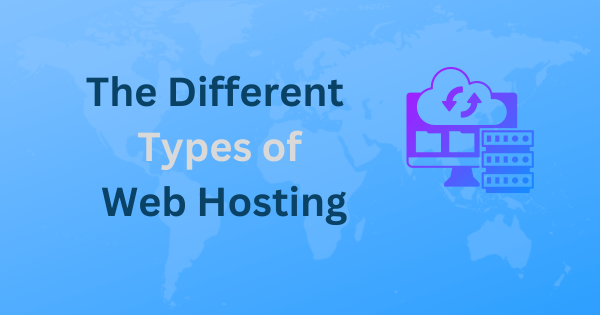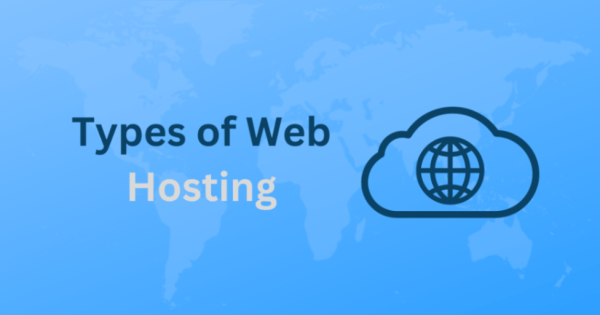The Different Types of Web Hosting – Which One is Right for You?

The Different Types of Web Hosting – Which One is Right for You? 2025 Guide
Ever feel overwhelmed by all the web hosting options out there? You’re not alone. In 2025, with websites powering everything from personal blogs to booming e-commerce empires, choosing the right hosting type can feel like picking the perfect pair of shoes—too tight, and you’ll regret it later; too loose, and you won’t get the support you need. But here’s the good news: understanding the different types of web hosting, their pros and cons, and how they fit your goals makes the decision straightforward. In this guide, we’ll break down the main types, share real-world examples, and help you pinpoint the best one for your needs. Whether you’re a newbie launching your first site or a business owner scaling up, let’s find your perfect match.
Why Understanding Web Hosting Types Matters in 2025
Web hosting is essentially renting space on a server to store your website files, making them accessible online. The type you choose affects speed, security, scalability, and cost—key factors in user experience and SEO rankings. With AI-driven sites and edge computing on the rise, 2025 hosting emphasizes performance and flexibility. Picking wrong? You might face slow load times or unexpected downtime. Picking right? Your site thrives. Let’s dive into the types.
Shared Hosting: The Budget-Friendly Starter Pack
Shared hosting is like living in a bustling apartment building—everyone shares the same space and resources, keeping costs low. Multiple websites live on one server, managed by the host.
Pros and Cons of Shared Hosting
- Pros: Super affordable (starting at $2-5/month), easy setup with one-click installs for WordPress, and great for beginners. Includes basics like free SSL and email.
- Cons: Limited resources mean one busy neighbor (another site) can slow yours down. Not ideal for high-traffic sites or custom needs.
Best For: Blogs, portfolios, or small sites with low traffic (under 10,000 visits/month). Providers like Hostinger shine here for value.
Tip: If you’re just testing ideas, start shared—upgrade later without hassle.
VPS Hosting: More Control Without the Full Commitment
Virtual Private Server (VPS) hosting carves out a virtual slice of a physical server for you, blending shared affordability with dedicated power. It’s like having your own apartment in that building—shared building, private space.
Pros and Cons of VPS Hosting
- Pros: Scalable resources (RAM, CPU), root access for custom tweaks, and better performance than shared ($2-110/month). Handles moderate traffic well.
- Cons: Requires some tech know-how for management; unmanaged plans mean you handle updates.
Best For: Growing sites, e-commerce starters, or developers needing flexibility. Liquid Web‘s VPS plans are top-rated for businesses.
Example: A freelance photographer with a portfolio site getting 50,000 visits/month could use VPS to add custom galleries without slowdowns.
Dedicated Hosting: Your Private Mansion on the Web
Dedicated hosting gives you an entire physical server—all resources, no sharing. It’s the luxury option for when you need total control and power.
Pros and Cons of Dedicated Hosting
- Pros: Maximum performance, security, and customization; handles heavy traffic effortlessly ($100-500+/month). Full root access.
- Cons: Pricey and requires expertise to manage; overkill for small sites.
Best For: High-traffic enterprises, gaming servers, or data-heavy apps. OVH or Hetzner excel for cost-effective dedicated setups.
Tip: Opt for managed dedicated if you’re not a server wizard—saves headaches.
Cloud Hosting: Scalable and Always-On
Cloud hosting pulls resources from multiple servers in a “cloud” network, so your site draws power as needed. It’s like a utility service—pay for what you use, scale instantly.
Pros and Cons of Cloud Hosting
- Pros: High uptime (99.99%+), auto-scaling for traffic spikes, and pay-as-you-go flexibility ($10-100+/month). Great for global audiences.
- Cons: Can get expensive with unpredictable usage; setup might be complex.
Best For: E-commerce sites with seasonal surges or apps needing reliability. Cloudways or Google Cloud are favorites for scalability.
Practical Tip: Monitor usage with built-in dashboards to avoid bill shocks.
Managed WordPress Hosting: Tailored for WP Users
This is shared or VPS optimized specifically for WordPress—automatic updates, security, and speed tweaks built-in.
Pros and Cons of Managed WordPress Hosting
- Pros: Hassle-free WP management, enhanced security, and fast caching ($5-50/month). Ideal for non-techies.
- Cons: Limited to WP; pricier than basic shared.
Best For: Blogs, agencies, or WP stores. SiteGround or WP Engine lead with performance.
Other Types: Reseller and Specialized Hosting
- Reseller Hosting: Buy wholesale space to resell—great for agencies ($10-50/month). Pros: Profitable; Cons: Overhead management.
- Specialized (e.g., Game Servers): Tailored for apps like Minecraft. Pros: Optimized; Cons: Niche and costly.
Case Study: How a Small E-Commerce Store Scaled with Cloud Hosting
Take Alex, who launched an online artisan jewelry shop in early 2025 using shared hosting from Bluehost. Initial sales were steady, but a viral TikTok post spiked traffic to 20,000 visits/day, crashing the site and losing $2,000 in sales. Switching to Cloudways‘ cloud hosting auto-scaled resources, boosting uptime to 99.99% and load times by 40%. By mid-year, revenue doubled to $50K/month. Alex’s switch highlights how cloud’s flexibility turns bottlenecks into growth.
User Experiences: Real Stories from Web Owners
Users rave about matches made in hosting heaven. Sarah, a blogger: “Shared with Hostinger was a steal at $3/month—my site loads fast, and I focus on writing, not tech woes.” Tech startup founder Mike: “VPS from Liquid Web gave us root access without the dedicated price tag; traffic surges? No sweat.” And e-com vet Lisa: “Managed WP on SiteGround saved my sanity—auto-updates mean zero hacks.” But beware mismatches: One Reddit user ditched Bluehost‘s shared for poor support during peaks.
Which Web Hosting Type is Right for You? A Quick Quiz
- Low budget, simple site? Shared.
- Growing traffic, some tech skills? VPS.
- High stakes, big audiences? Dedicated or Cloud.
- WordPress devotee? Managed WP.
Consider traffic, budget, and expertise—most hosts offer easy upgrades.
Wrapping It Up: Launch Your Site with Confidence
Navigating the different types of web hosting in 2025 doesn’t have to be daunting. From budget shared setups to powerhouse cloud solutions, there’s a fit for every creator. Remember, the best choice aligns with your current needs while allowing growth. Start small, monitor performance, and scale as you soar.
Ready to get online? Compare providers like Hostinger or SiteGround today, snag a deal, and build your digital dream. Your audience is waiting—what’s your first move?
FAQ: Quick Answers on Web Hosting Types
- What’s the cheapest type of web hosting? Shared hosting, starting at $2-5/month, perfect for beginners.
- When should I upgrade from shared hosting? When traffic exceeds 10,000 visits/month or you need custom features—go VPS or cloud.
- Is managed WordPress worth the extra cost? Yes, for security and speed if you’re WP-exclusive; saves time over basic shared.
- How does cloud hosting handle traffic spikes? It auto-scales resources from multiple servers, ensuring 99.99% uptime.
- What’s the difference between VPS and dedicated? VPS is virtual (shared hardware, private resources); dedicated is full physical server for ultimate power.
In today’s digital age, having a strong online presence is crucial for businesses and individuals alike. One of the key components of establishing that presence is choosing the right web hosting solution. With a plethora of options available, it can be perplexing to determine which type of web hosting is best suited for your needs. In this article, we’ll delve into the different types of web hosting and help you navigate through the maze of options to find the one that fits your requirements like a glove.
Table of Contents
The Different Types of Web Hosting
Shared Hosting
Pros and Cons
Shared hosting is one of the most budget-friendly hosting options available. In this setup, multiple websites share the same server resources, such as CPU, RAM, and storage space.
Pros:
- Cost-effective
- User-friendly for beginners
- Managed by the hosting provider
Cons:
- Limited resources
- Performance may suffer during high traffic
Ideal for Whom?
Shared hosting is ideal for individuals or small businesses with minimal website traffic and tight budgets. It’s a great choice for those starting their online journey.
Virtual Private Server (VPS) Hosting
Pros and Cons
Virtual Private Server (VPS) hosting offers a middle ground between shared and dedicated hosting. It involves partitioning a physical server into multiple virtual servers, each with its dedicated resources.
Pros:
- More control and customization
- Better performance than shared hosting
- Scalable
Cons:
- More expensive than shared hosting
Ideal for Whom?
VPS hosting is suitable for businesses that have outgrown shared hosting but don’t require the resources of a dedicated server. It provides more control and flexibility.
Dedicated Hosting
Pros and Cons
Dedicated hosting provides an entire server exclusively for your website. You have full control over server resources and configurations.
Pros:
- Maximum performance and customization
- Enhanced security
- Ideal for resource-intensive websites
Cons:
- High cost
- Requires technical expertise to manage
Ideal for Whom?
Dedicated hosting is ideal for large businesses, e-commerce sites, and applications with high traffic and resource demands.
Cloud Hosting
Pros and Cons
Cloud hosting utilizes a network of virtual servers, making it highly scalable and reliable. Resources are distributed across multiple servers, reducing the risk of downtime.
Pros:
- Scalable and flexible
- Pay-as-you-go pricing
- High reliability
Cons:
- Costs can add up with usage
- May require technical expertise
Ideal for Whom?
Cloud hosting is suitable for businesses with fluctuating traffic and resource needs. It’s a cost-effective option for those who need scalability.
WordPress Hosting
Pros and Cons
WordPress hosting is tailored specifically for WordPress websites, offering optimized performance, security, and support.
Pros:
- Easy WordPress installation and management
- Enhanced security features
- Expert support for WordPress issues
Cons:
- Limited to WordPress websites
- Slightly more expensive than shared hosting
Ideal for Whom?
WordPress hosting is perfect for bloggers, small businesses, and anyone running a WordPress-powered website.
E-commerce Hosting
Pros and Cons
E-commerce hosting is designed for online stores and comes with features like secure payment processing and e-commerce-specific tools.
Pros:
- E-commerce features and integrations
- Enhanced security for online transactions
- Scalable for growing businesses
Cons:
- Can be costly for small businesses
- May require technical expertise
Ideal for Whom?
E-commerce hosting is essential for online retailers and businesses looking to sell products or services online.
Reseller Hosting
Pros and Cons
Reseller hosting allows you to become a hosting provider yourself. You purchase hosting resources and sell them to your clients.
Pros:
- Opportunity for a hosting business
- Full control over client accounts
- Potential for profit
Cons:
- Requires technical knowledge
- Responsibility for client support
Ideal for Whom?
Reseller hosting is suitable for entrepreneurs who want to start their hosting business or web developers managing multiple client websites.
Managed Hosting
Pros and Cons
Managed hosting takes the burden of server management off your shoulders. The hosting provider handles all technical aspects.
Pros:
- No server management required
- Expert support
- Ideal for non-technical users
Cons:
- Higher cost
- Limited customization
Ideal for Whom?
Managed hosting is ideal for businesses and individuals who want a hassle-free hosting experience without the need for technical expertise.
Colocation Hosting
Pros and Cons
Colocation hosting involves renting server space in a data center. You provide the physical server, and the data center takes care of the infrastructure.
Pros:
- Full control over server hardware
- High-level security
- Ideal for large-scale operations
Cons:
- Expensive setup and maintenance
- Requires technical knowledge
Ideal for Whom?
Colocation hosting is suitable for enterprises with specific hardware requirements and the technical capacity to manage their servers.

Factors to Consider When Choosing a Web Hosting Plan
Performance
The speed and reliability of your hosting play a significant role in user experience.
Scalability
Consider whether the hosting solution can accommodate your website’s growth.
Security
Protecting your website and user data is paramount. Look for robust security features.
Customer Support
Responsive and knowledgeable customer support can be a lifesaver in times of trouble.
Cost
Choose a hosting plan that fits your budget but doesn’t compromise on essential features.
FAQs
Shared hosting is an excellent choice for small blogs due to its affordability and simplicity.
Yes, cloud hosting's scalability and reliability make it an ideal choice for e-commerce.
Yes, colocation hosting requires knowledge of server management and hardware.
Yes, most hosting providers offer seamless upgrades as your website grows.
Conclusion
In finality, the classification of web hosting to embrace shall be contingent upon the specifications and capacities of your online platform. For a website with scarce web traffic, shared hosting might prove propitious. Conversely, for a massive enterprise with substantial web traffic, dedicated hosting could be the appropriate choice. It is imperative to reflect on your alternatives meticulously and select the optimal web hosting solution for your website.
